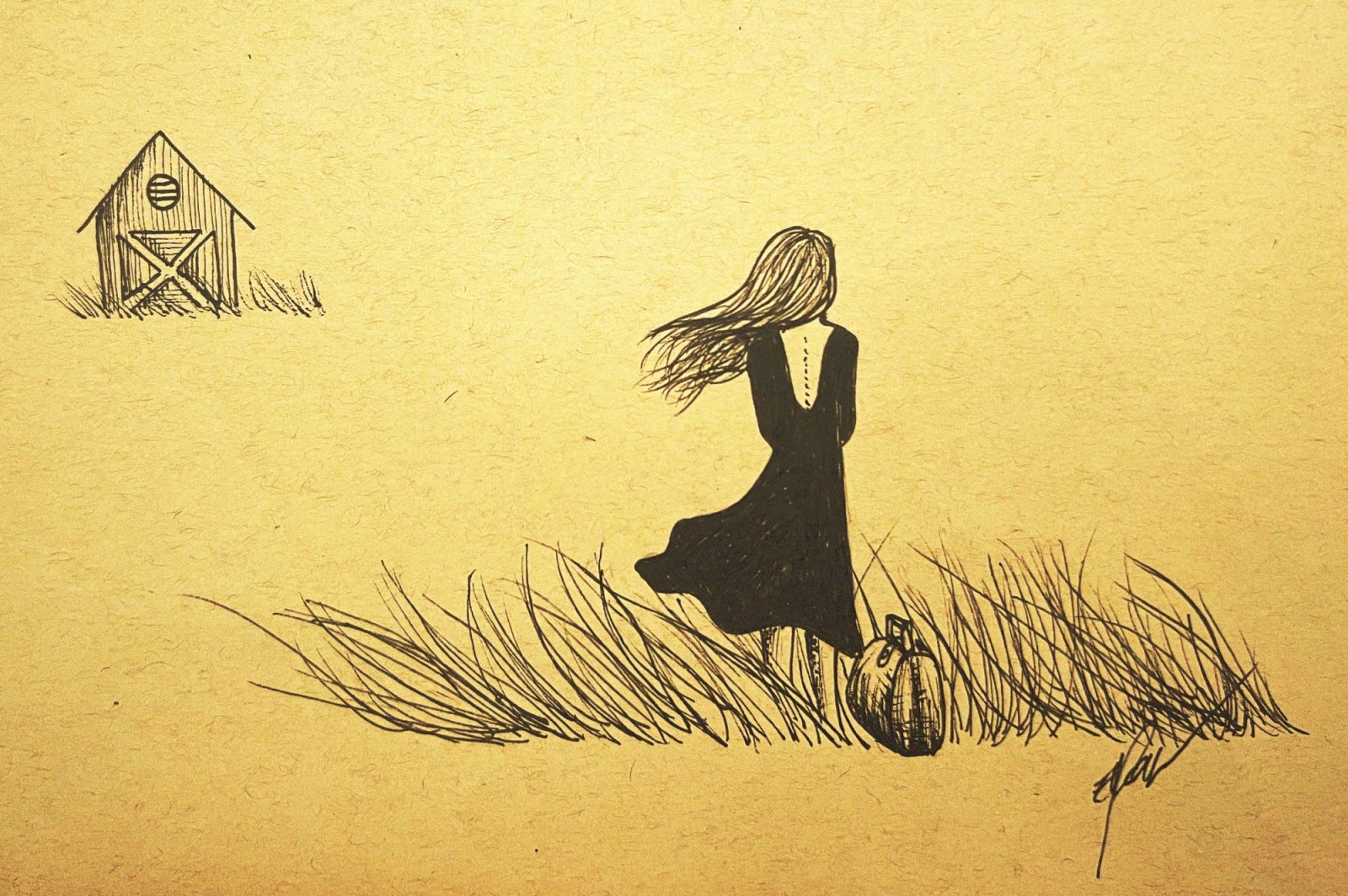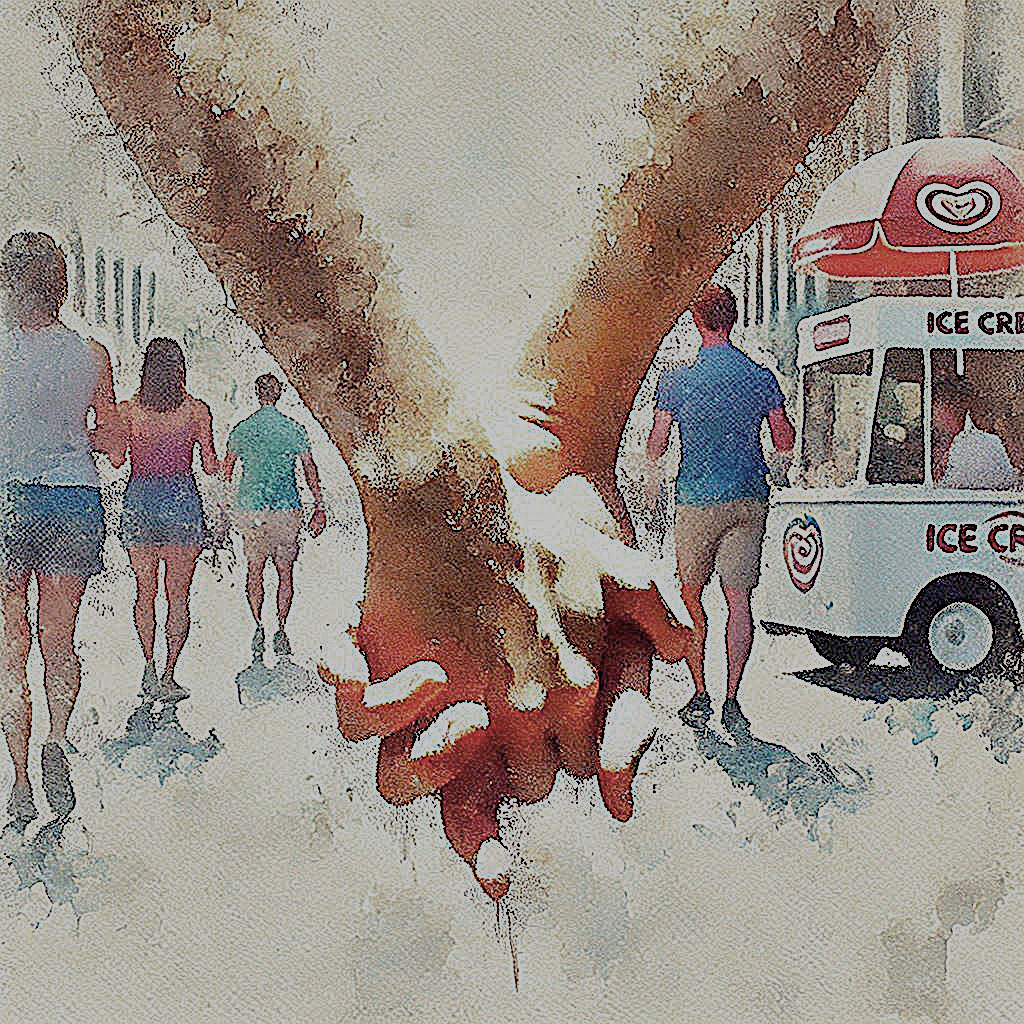
Karina of the West
She first arrived when the corn started drying out in the fields.
No one saw where she came from, only that she had the look of someone who had lost more than most in her young life. Silver threads streaked through her otherwise mousey brown locks, and they called her Karina.
It was the Peyton family that found her; the youngest of the boys was repairing a long-broken tractor when she arrived. He reported to us later that the girl had only one bag, and that it was bulbous and rattled as she walked.
The boy, our boy, Sean Peyton, led her back to his family’s farmhouse and sat her down at the kitchen table, where Mrs. Peyton was preparing dinner. When asked where she was from, Karina only shook her head. She drank the black tea Mrs. Peyton gave her, and ate the slice of buttered toast. Sean told us her eyes looked black.
The older boys returned from the fields, their ball caps well-coated in dust. They saw Karina there with her tangled, windswept hair, her stained pants and ripped maize-colored sweatshirt. The two eldest, Colin and Declan, narrowed their eyes in suspicion. There had been rumors of a young woman making rounds in the countryside, who would only leave death in her wake.
Fintan, on the other hand, was mesmerized by this girl. He felt a pull towards her, as if there was a thread going from his sternum to hers. She must have felt him watching her, because she looked up and smiled.
Mrs. Peyton saw this exchange and pursed her lips. It wouldn’t do for one of her boys to fancy himself in love; there was no time for such things. But Mrs. Peyton had standards, and so she put Karina up in Colin and Declan’s room, and instructed them to sleep out in the barn.
“The hay is soft enough in the loft,” she told them when leading the grumbling boys outside.
Karina, to her credit, tried to convince Mrs. Peyton to let her be the one to sleep in the barn, but Mrs. Peyton would have none of that. “You’re a young lady, and besides,” said Mrs. Peyton, “You look like death.”
That night, when everyone was supposed to be asleep, Sean and Fintan both sat up in their beds on opposite sides of their shared room, and thought of Karina. It had been so long since either of them had seen a woman other than their mother. There were hardly any folks left on this side of the Indiana-Ohio border.
The window panes rattled as the dust storm battered the old house, and Karina covered her nose and mouth with a cloth she had used for just this purpose as she was crossing the continent. She did her best to hide her coughing, but we could hear it just fine.
Narrow streams of dust sifted in between the cracks in the windows, cracks under the doors. Wrapped in a cocoon of blankets, next to the empty space her husband was supposed to be occupying, Mrs. Peyton cursed herself. With Karina’s arrival, she had been too busy to remind the boys to stuff the cracks of the house with bits of cloth and paper. In the morning, everything would be covered in a fine layer of dust.
Out in the barn, Colin and Declan scurried about covering the fissures and holes, if only to keep the animals calm so they could sleep.
“It’s that Karina’s fault,” said Declan. “Shoulda never let her in the house.”
Colin grunted his agreement.
Around them, the animals made their nervous sounds and shifted around their stalls.
“She’s a witch, that’s what she is,” said Colin, as they wrapped themselves in the scratchy flannel blankets. Each of them fell asleep thinking of ways to rid their land of Karina, though in their dreams they were learning how to keep her.
When the next day dawned, the boys went out into the fields to find half of the crop blown over and buried in earth. Mrs. Peyton stood on the front porch, ringing the worry out of her hands with a dishtowel.
Karina stood just behind her, eyes still crusted with sleep.
Fintan glanced back at the house and saw the girl’s lithe form. He turned himself right around and walked back to the house, Sean clipping at his heels. Neither of the boys glanced at their mother.
“How did you sleep?” asked Fintan.
Karina turned to him, and perhaps she saw something of love in his eyes because she smiled. She told him she’d slept just fine, thank you.
“Boys, I need you back in the fields. We’ve got to figure out what to do,” said Mrs. Peyton. “I’ll take care of Karina.”
With reluctance, the boys returned back to their brothers. Karina and Mrs. Peyton disappeared inside the house.
The day was dull around the Peyton boys. They harnessed the horse team and attached the ancient plow, if only to remove some of the dead crop. Because they were the youngest, Fintan and Sean were tasked with using shovels to remove the fine, silk-like dirt.
Surrounding the fields were abandoned machines: the tractor Sean had been working on when Karina arrived, a dull green pick up truck that hadn’t worked for decades, and the scattered remains of a combine. None of the boys had ever seen the days when these trinkets had worked, though Mrs. Peyton could remember stories her parents told her of a time when machines would do a person’s bidding. She recalled hearing tales of whole rainy seasons, of snow drifts that would coat the cow fences.
The Peyton boys removed swaths of fallen corn stalks and heaped them up into a burn pile. In the days that would come, black smoke trails would be seen rising up from the farms of this midwestern reach as farmers came to terms with another batch of lost crop.
Sometime between the dirt-scooping and corn-piling, Fintan disappeared around the back side of the farmhouse. There was a spindly old oak tree there that he would use to climb down at night if he wanted to leave without being caught by his mother, and it passed right by Colin and Declan’s window.
By some work of coincidence, it was then that Karina was opening the window to sweep out some of the dust. Fintan got a facefull as he rose up those final branches to his destination.
Karina apologized and reached out of the window to brush away the earth from Fintan’s ruddy hair. Her touch almost made him lose his grip.
“Are you all right in here?” he asked. “Is my mother treating you well?”
She nodded and confirmed that yes, Mrs. Peyton was treating her just fine.
From around the corner, Sean stood against the house, listening. Something akin to hate fired in his chest.
He would tell us later how much he hated his brother in that moment, and we could see plainly that it was true.
The sky grew to a dark shade of storm, though everyone knew it only promised lightning and no rain. The boys gathered inside the kitchen, and Mrs. Peyton again served tea and toast. Karina helped close shutters and lock doors, and Declan went out to secure the barn.
Everything in the house rattled on cue with the thunder, and under the kitchen table, Fintan found Karina’s hand—two sweaty palms clasped together. It would be there in the kitchen after dark, two days later, that they would pull each other close and feel the touch of one another.
But not tonight.
A dull ache of thunder sounded coupled with a scream. Mrs. Peyton dropped to the floor and put her hands to her chest. Like a hound on a scent, Colin threw open the latch on the door and ran outside to find his older brother.
Fintan pulled his hand from Karina’s and went to the door. Sean crouched down with his mother and tried to get her up onto a chair.
Harsh wind slammed against the house, and another batch of thunder rumbled low in the distance. Colin’s cry for help drew them all to the door next to Fintan.
Across the short dirt yard, the barn doors were banging open like the nervous wings of a sparrow. On the ground, Colin gripped Declan’s charred and empty body—it was a lightning strike that took him. Mrs. Peyton let out a cry so raw that Sean had to cover his ears. Fintan caught his mother before she fell to the ground, and led her back into the house.
Karina made to step outside to go help Colin, but he yelled for her to stop.
“She’s a witch,” he howled, but the wind swept his words away. The same breath of wind slapped against Karina’s face and tore her hair out of its braid.
Sean got to his feet and wobbled to his brother. Together they dragged Delcan past Karina and into the living room, his flesh giving off a burnt smell that would remain in the house long after everyone was gone.
The ground was so hard-packed from lack of rain that they could not bury him the next day. Instead, they wrapped his body in an old sheet and tucked him among the dried out husks of corn. Mrs. Peyton remained inside when Colin lit the fire.
Fintan held Karina’s hand in his, and Sean stood by, bristling.
Only Colin felt the death for his brother among them, and he knew it was because of Karina. In his heart that was turning to stone, he vowed to have her killed.
Sean would tell us later how he felt watching Fintan stand so close to Karina. How the red hot envy tore at his insides.
The farmhouse was dark that night. No light came from Mrs. Peyton’s room, Sean’s or Fintan’s. Colin sat on the front porch still in his field boots, staring at the smoldering pile of remains. Behind him, the floorboards creaked and somehow, he knew it was Karina. He squeezed his fists in anger.
Violent images played out in his mind, and he felt himself slipping into a kind of waking unconsciousness.
Everyone woke the next morning not to the bright sunlight streaming into the house, but of the sound of coughing. Sean went to check on his mother, and that’s when he saw the blood in her cupped palm.
He called for his brothers, but only Fintan came. He helped Mrs. Peyton take a sip of water.
“It’s the dust.”
The boys swiveled around. Karina stood at the door frame, a frown drawing her features down.
“It’s slowly killing us,” she continued. “It’s why I traveled east.”
Fintan and Sean exchanged a look before turning back to their mother. Perhaps they had all known this truth, that eventually they would all go by way of the earth. That they, too, would return to dust.
Mrs. Peyton didn’t get out of bed the rest of the day. Colin only checked on her once, and when he did, he was even more convinced that it was Karina out to kill them all.
When he shared this with Fintan, they broke into an argument.
“She is not responsible for Declan’s death,” hissed Fintan. “It was a freak accident.”
“Can’t you see?” said Colin. “She’s put you under her spell. Fintan, you have to get away from her.”
But it was that very night that Fintan and Karina found each other in the dim light of the kitchen, the moonlight brighter than it should have been. The moment she slid her fingers under the hem of his shirt, Fintan let his mind go blissfully blank. They stumbled against the counter and nearly knocked over a vase. Karina caught it and shoved it towards the back of the counter and pressed herself more firmly against Fintan.
The scrape of the vase almost falling drew Colin and Sean from slumber. Sean folded his pillow over his ears and tried to ignore the ripping jealousy in his stomach. Colin, on the other hand, crept downstairs to break them apart. But when he arrived in the kitchen, they were gone, the back screen door swinging open on its hinges.
Which is why he went into the cellar to find the old package of rat poison. Which is how he ended up slipping a few tabs into Karina’s morning coffee. Feeling the guilt of what he was doing, Colin went outside to feed the animals. Which is why he didn’t realize that it was not Karina’s coffee cup he had poisoned, but Fintan’s.
So when Mrs. Peyton let out a second scream of grief in a single week, Colin began to realize his mistake.
Looking down at Fintan’s body, Sean felt like his insides had been hollowed out. He knew he was crying, but he could not feel the tears on his cheeks, could not feel his body shaking with sobs. Karina knelt next to him, a look of pain etched so deeply across her features that it felt like another blow to Sean’s very soul.
Colin staggered back into the house, his throat raw from screaming. With numb hands, he went to his mother and took her back to her room, her body rattled with coughs and sobs.
Which is why, when the dust storm descended upon them that evening, after making sure the house was secured and his remaining family would be safe inside, Colin walked straight out the front door and into the silty earth that would fill his lungs and drown him by the hour’s end.
Sean stayed in the same room as his mother that night, to look after her. He himself had begun to cough up blood, and he knew with staggering clarity that none of them had long. It was why no one in the town had been there to visit it so long, it was why they hadn’t been able to sell any of the crops for the past year; there was no one left to sell to. The dust was simply making its rounds across the continent and eliminating them all.
Karina came into the room that night, her silhouette blurred in shadow. She sat at the edge of the bed next to Sean, but she did not touch him. Mrs. Peyton’s wheezing breaths made the whole house seem small.
The night passed slowly, and Sean would later tell us how cold he felt, how vastly empty. And though he and Karina fell asleep next to one another, he felt nothing by a grating loneliness.
Morning dawned achingly bright, and after calling for Colin to no avail, Sean finally walked to the edge of the property. Karina found him there, crouched over another of his brothers’ lifeless forms, and it was she who helped place his body next to Fintan’s in another pile of brittle stalks.
“Don’t let my mother know,” whispered Sean as the pile went up in flames.
They stood apart, these two last witnesses, as the black smoke reached towards the already hazy sky.
The days wore on, and both Sean and Karina tried to tend to the farm as best they could. With little well water, they made the choice to abandon the crops altogether and ration it out among themselves and the remaining animals. The place had an air of destitution.
Mrs. Peyton’s condition only worsened, and so one evening after a meager supper of canned peaches and plain toast, Karina pulled out a vial of dark brown liquid from her bulging, rattling bag. She handed it to Sean. “It will make her passing painless and quick,” she said.
He studied the bottle. “You were saving this for yourself?”
She dipped her head. “It won’t be long for us now, Sean.” She reached over and touched his hand.
They curled up with each other that night in Sean’s twin bed, not for intimacy, but to know that they were not alone in the big empty house. No more did Mrs. Peyton’s coughing echo through the halls, no more did Fintan wake up the house with his window creaking open so he could sneak out; no more did Declan’s booming voice fill the vast rooms in place of Mr. Peyton’s, no more did Colin’s bootsepts rattle the whole house.
Sean and Karina studied each other’s faces in a slip of moonlight. Sean would tell us later that Karina revealed her whole story to him, that she was born in the territory that was once known as Arizona to a family of thirteen. Dust storms had killed most of the survivors around them years before, but still her family tried to survive. They raised cattle and on good nights could even see the stars. Three years ago, the last of her siblings passed away from the dust poisoning, and she had set off on her own with the big bag that rattled.
Her goal was to make it to the eastern coast where it was rumored to still rain. But she’d only made it as far as Indiana, though Sean didn’t tell her this. Maybe she thought she had almost made it to the sea.
The sun did not shine that next morning, for the dust was so thick in the air. They didn’t dare risk going outside, so they left Mrs. Peyton’s body in her room, shrouded in blankets.
Karina made the last of the tea for them and the last of the toast. Sean hadn’t realized that they were running out of food, that his mother had deliberately kept it from them.
“We would have starved to death, anyway,” he murmured.
Karina lay on the moth-eaten couch, her breathing growing shallow. Sean went to her and tried to get her to drink some water but she refused.
“You should leave, Sean,” she said, voice raspy. “You could make it to the coast.”
He tried to give her a faint smile, tried to tell her he would try, but he knew his own body was beginning to betray him. So he stayed silent and again attempted to give her water.
The days dragged on and Karina began to waste away. Sean felt completely detached from her, wondered why he’d even let himself care so much if everyone was just to die in the end.
He came downstairs one morning to find the couch empty. He opened the door and traced the steps he took to find Colin, but there was no sign of her.
Only we knew where she had gone, that she had stumbled into our fields to hide herself away from Sean, so that he wouldn’t have to see another person dead in his house.
After hours of searching, Sean made his way up into what had been Colin and Declan’s room. Tucked into the corner was Karina’s rattling bag. He approached it as if it were a wild animal, and went down on his knees before it.
He carefully untied the bag and lurched back in shock.
The bag was filled with bones. Bones that were picked clean. Bones that glimmered in the lantern light and were white as flashing teeth.
Sean left the room, his whole body trembling.
An hour later, he left the farmhouse for the last time, a satchel draped over his shoulder. Inside his bag, he had no bones. Only supplies to get him across the border to Ohio. He would travel east and he would try to find the Atlantic.
He released all of the animals but one skin-and-bones horse, who he led over to our edges. But something changed in him as he walked across that short spanse of land. The faded light in him seemed to go out.
Sean dropped the lead rope and fell to his knees.
We, the corn, looked down at his slouched and beaten form. We listened to his rattling cough.
“I have to leave,” he croaked. From his pocket he pulled a matchbook.
In our depths, Karina stirred.
Sean looked back to the skin-and-bones horse and his faded brown satchel and then back to us. Like a piece of old newspaper, we saw something in him crumple.
His hands were shaking as he lit the match.
Karina got to her feet, suddenly and brilliantly alive.
Our dried stalks caught easily, and as Karina walked out of the burning flames of our body, Sean walked in.
She called his name, her lungs suddenly clear for shouting. We continued to burn with our Sean, and by the time we began to crumble and turn into dust, Karina was on the horse. And then Karina was riding away.
And then Karina was gone.
Suggested Reading
-
about Lollipop, Lollipop![Lollipop]()
Featured • Fiction • Nonfiction
Lollipop, Lollipop
The figure moved slowly, deliberately, its shrouded head turning towards Josh. Those eyes—sharp and frigid as icepicks—stared at him. The man’s black lips never moved, even as a word pierced him like a yell: “Beware.”
Featured • Fiction • Nonfiction
-
Featured • Fiction
-
Fiction



